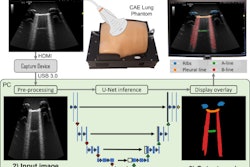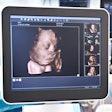Lung ultrasound may help predict delirium in elderly COVID-19 patients, according to research published July 2 in Archives of Gerontology and Geriatrics Plus.
A team led by Thomas Fraccalini, MD, from San Luigi Gonzaga Hospital in Turin, Italy, found that higher lung ultrasound scores and cognitive impairment are strong predictors of delirium in elderly patients with COVID-19.
“While delirium is multifactorial, integrating lung ultrasound into routine assessment may improve early detection and management in resource-limited settings, effectively identifying high-risk patients using an accessible bedside investigation,” the Fraccalini team wrote.
Delirium is an acute confusional state that is common in elderly hospitalized COVID-19 patients, previous reports have found. It is linked to poor outcomes, but the authors noted that since symptoms of the condition overlap with those of dementia, it is often underdiagnosed.
Lung ultrasound emerged as a useful tool during the height of the COVID-19 pandemic. Previous studies have shown that lung ultrasound has high accuracy in diagnosing interstitial pneumonia related to SARS-CoV-2 infection that causes COVID-19. By assessing pulmonary involvement for COVID-19 disease severity, lung ultrasound could help predict psychological stress in elderly patients, the authors highlighted.
Fraccalini and co-authors introduced their approach, the Lung Ultrasound Extension Score (LUSext). The method focuses on the extent of lung lesions rather than aeration assessment. The researchers wrote that this approach is more immediate and easier to perform at the bedside.
The study included 57 patients with an average age of 82.6 years. The team assessed pulmonary involvement using LUSext while also using the mini-mental state examination (MMSE) and 4AT cognitive tests (cutoff ≥ 4 for delirium) to measure cognition.
Delirium occurred in 35 patients (61.4%) (35/57). Univariate analysis tied delirium to pre-existing dementia (p = 0.03), higher LUS scores (p = 0.004), and lower MMSE scores (p = 0.0002).
Lung ultrasound scores above 3 best predicted delirium, with a sensitivity of 74% and a specificity of 82%. Multivariate analysis confirmed this finding, with an odds ratio (OR) of 4.22 (p = 0.023). And MMSE also emerged as an independent risk factor with an OR of 0.87 (p = 0.007).
The study authors highlighted that pilot programs are underway that are integrating lung ultrasound screening with nonpharmacological interventions.
“This translational step aims to validate whether early, physiology-based risk stratification can guide precision prevention, addressing both the 'stress' [pulmonary involvement] and 'vulnerability' [cognitive reserve] components of delirium pathogenesis in resource-constrained settings,” they wrote.
The full study can be found here.




















